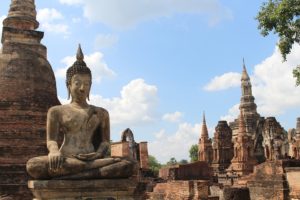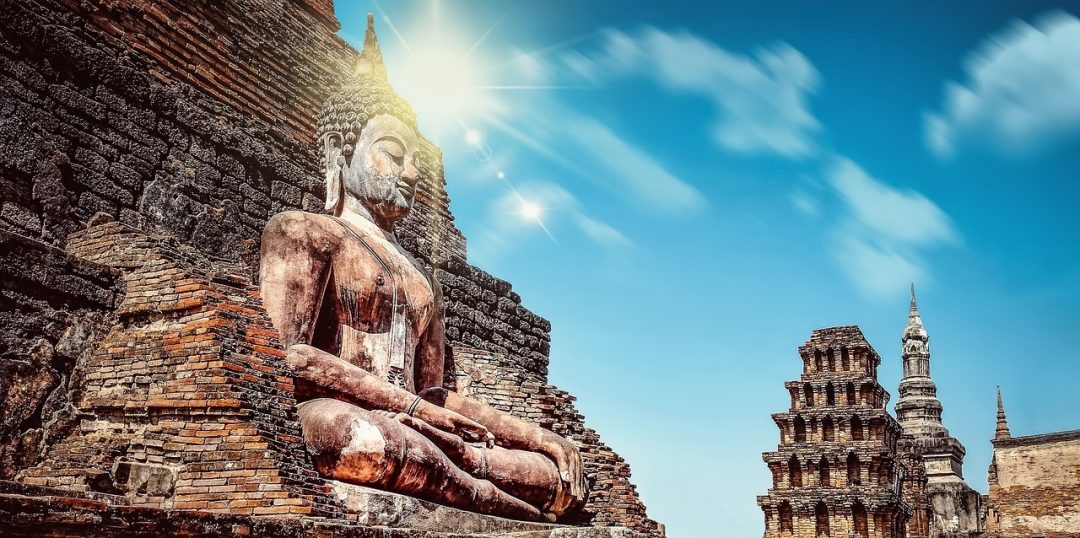Roshi is sick as a dog. A Zen monk inquires with great concern, “How is your health these days?”
Roshi answers, “Sun Face Buddha, Moon Face Buddha!”
Pointer:
A Sun Face Buddha lives two-thousand years. A Moon Face Buddha lives twenty-four hours.
Roshi, being a compassionate teacher, even in the throes of his illness, gives this well-meaning but foolish monk a kind word.
Discussion:
Whether we live for two-thousand years or twenty-four hours, we live only now. It is nonsense to say there is no future. However, whatever we do in the moment determines our destiny-stream – the future is already here and now. Live in awareness of the moment and the future takes care of itself.
Roshi saying “Sun Face Buddha, Moon Face Buddha!” makes a statement that his good health is “now” as well as his ill health. He may obviously feel one more than the other, yet he is philosophically aware of both – he takes life for what it is in the moment, and it is all things: pain, pleasure, beauty, ugliness, ill and good health; this perception that he holds does not change with his state of health. Yesterday began with a chance that Roshi could live or die now or later. Today holds the same fate. Roshi tells the concerned monk that now, as always, he is leading a full life. This is not to say he is happy to be in discomfort, but he understands and accepts it for what it is.
If he is aware of his “now” for twenty-four hours, and sleeps through his “now” for the next two-thousand years, he has only lived twenty-four hours!
 The pain of ill health and the pleasure of good health are part of the one destiny-stream. No point exists in Roshi’s perception of how many days he has been sick or will be sick because there is only today and today he is ill. He may have his illness, but unlike most of us who feel trapped and fearfully count our sick days and distress over a possibly sick future or no future, his illness does not have him, and if it kills him sooner rather than later, he will have lived a full life.
The pain of ill health and the pleasure of good health are part of the one destiny-stream. No point exists in Roshi’s perception of how many days he has been sick or will be sick because there is only today and today he is ill. He may have his illness, but unlike most of us who feel trapped and fearfully count our sick days and distress over a possibly sick future or no future, his illness does not have him, and if it kills him sooner rather than later, he will have lived a full life.
I have personally known people who lived long years with terminal illness, yet who have done what they could with what they were given: one breast, one lung, one kidney, one arm, no legs – and I have known those who lived with relatively good health and never really awoke to their moments of life given.
On his death bed the historical Buddha expressed his leading a full life by teaching with compassion to Cunda, his host who accidentally served Buddha a bad piece of meat they both understood would cause his death.
One woman I know was told when quite young that she had cancer. At that time in our medical history this meant an absolute death sentence. When asked if she would like to join a cancer support group she said, “I have no intention of spending my limited time thinking and talking about my limited time. I am an artist. I am going to travel, meet other artists and paint. Do you know of a good artists’ support group?” One of her paintings hangs in my home. I visited with her two weeks before her passing. She was vitally interested in her world, reading the entire newspaper as she always did every morning. Although she was in great pain, she was also planning a trip from California to Alaska and thought she might get involved in city planning in Los Angeles on her return. Earlier in her life as an educator – long into her cancer – she founded one of the first Montessori schools in America. She died at the age of ninety having been a pioneer in the arts and education field as well as a successful independent artist. Without doubt she had her sick days, but they did not have her.
Resolution:
“Sun Face Buddha, Moon Face Buddha!” What is this all about?





